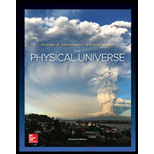
Physical Universe
16th Edition
ISBN: 9780077862619
Author: KRAUSKOPF, Konrad B. (konrad Bates), Beiser, Arthur
Publisher: Mcgraw-hill Education,
expand_more
expand_more
format_list_bulleted
Textbook Question
Chapter 1, Problem 14E
Ancient astronomers were troubled by variations in the brightnesses of the various planets with time. Does the ptolemaic or the copernican model account better for these variations?
Expert Solution & Answer
Want to see the full answer?
Check out a sample textbook solution
Students have asked these similar questions
What was so significant about Tycho Brahe's observations of the position of the planets that enabled Kepler to eventually come up with his theory that planets orbit the Sun in ellipses rather than circles?
If Kepler did not have access to Tycho's data, do you think he would have came up with the same theory, or do you think he would have preferred either the Copernican or Ptolemaic theory?
How did the telescopic observation of Galileo support the heliocentric model of the solar system?
Why wasn’t the Copernican model immediately accepted?
Chapter 1 Solutions
Physical Universe
Ch. 1 - The scientific method is a. continuing process b....Ch. 1 - A scientific law or theory is valid a. forever b....Ch. 1 - A hypothesis is a. a new scientific idea b. a...Ch. 1 - The ongoing evolution of living things a. is one...Ch. 1 - The object in the sky that apparently moves least...Ch. 1 - A constellation is a. an especially bright star b....Ch. 1 - Which of the following is no longer considered...Ch. 1 - A planet not visible to the naked eye is a. Mars...Ch. 1 - The planet closest to the sun is a. earth b. Venus...Ch. 1 - Prob. 10MC
Ch. 1 - Kepler modified the copernican system by showing...Ch. 1 - The speed of a planet in its orbit around the sun...Ch. 1 - According to Keplers third law, the time needed...Ch. 1 - The law of gravity a. applies only to large bodies...Ch. 1 - The earth bulges slightly at the equator and is...Ch. 1 - The usual tidal pattern in most parts of the world...Ch. 1 - Tides are caused a. only by the sun b. only by the...Ch. 1 - High tide occurs at a given place a. only when the...Ch. 1 - The prefix micro stands for a. 1/10 b. 1/100 c....Ch. 1 - A centimeter is a. 0.001 m b. 0.01 m c. 0.1 m d....Ch. 1 - Of the following, the shortest is a. 1 mm b. 0.01...Ch. 1 - Of the following, the longest is a. 1000 ft b. 500...Ch. 1 - A person is 180 cm tall. This is equivalent to a....Ch. 1 - The measurements of a room are given as length =...Ch. 1 - Prob. 1ECh. 1 - Prob. 2ECh. 1 - What is the difference between a hypothesis and a...Ch. 1 - Prob. 4ECh. 1 - According to the physicist Richard Feynman,...Ch. 1 - What does a year correspond to in terms of...Ch. 1 - You are lost in the northern hemisphere in the...Ch. 1 - In terms of what you would actually observe, what...Ch. 1 - What must be your location if the stars move...Ch. 1 - How do leap years fit into the ptolemaic system?...Ch. 1 - From observations of the moon, why would you...Ch. 1 - The sun, moon, and planets all follow...Ch. 1 - What is the basic difference between the ptolemaic...Ch. 1 - Ancient astronomers were troubled by variations in...Ch. 1 - Compare the ptolemaic and copernican explanations...Ch. 1 - What do you think is the reason scientists use an...Ch. 1 - The average distance from the earth to the sun is...Ch. 1 - As the earth revolves around the sun, some stars...Ch. 1 - Why is gravity considered a fundamental force...Ch. 1 - What, if anything, would happen to the shape of...Ch. 1 - What is the difference between spring and neap...Ch. 1 - The length of the day has varied. When did the...Ch. 1 - The earth takes almost exactly 24 h to make a...Ch. 1 - Does the sun or the moon have the greater...Ch. 1 - In the following pairs of length units, which is...Ch. 1 - A European driving from Paris to Brussels finds...Ch. 1 - The worlds tallest tree is a sequoia in California...Ch. 1 - The diameter of an atom is roughly 104 times the...Ch. 1 - How many square feet are there in an area of 1.00...Ch. 1 - A swimming pool is 20.00 m long, 7.00 m wide, and...Ch. 1 - The speedometer of a European car gives its speed...Ch. 1 - A horse galloped a mile in 2 min 35 s. What was...Ch. 1 - How many microphones are there in a megaphone?Ch. 1 - Use the proper number of significant figures to...Ch. 1 - Prob. 35E
Knowledge Booster
Learn more about
Need a deep-dive on the concept behind this application? Look no further. Learn more about this topic, physics and related others by exploring similar questions and additional content below.Similar questions
- In what ways did the work of Copernicus and Galileo differ from the views of the ancient Greeks and of their contemporaries?arrow_forwardWhy did Copernicus want to develop a completely new system for predicting planetary positions? Provide two reasons.arrow_forwardWhat are two ways in which Aristotle deduced that Earth is spherical?arrow_forward
- Why did Ptolemy have to introduce multiple circles of motion for the planets instead of a single, simple circle to represent the planet’s motion around the Sun?arrow_forwardWhy did Kepler need Tycho Brahe’s data to formulate his laws?arrow_forwardWhich of Keplers or Newtons laws best describes Aristotelean violent motions?arrow_forward
arrow_back_ios
arrow_forward_ios
Recommended textbooks for you
 Foundations of Astronomy (MindTap Course List)PhysicsISBN:9781337399920Author:Michael A. Seeds, Dana BackmanPublisher:Cengage Learning
Foundations of Astronomy (MindTap Course List)PhysicsISBN:9781337399920Author:Michael A. Seeds, Dana BackmanPublisher:Cengage Learning Stars and Galaxies (MindTap Course List)PhysicsISBN:9781337399944Author:Michael A. SeedsPublisher:Cengage Learning
Stars and Galaxies (MindTap Course List)PhysicsISBN:9781337399944Author:Michael A. SeedsPublisher:Cengage Learning
 AstronomyPhysicsISBN:9781938168284Author:Andrew Fraknoi; David Morrison; Sidney C. WolffPublisher:OpenStax
AstronomyPhysicsISBN:9781938168284Author:Andrew Fraknoi; David Morrison; Sidney C. WolffPublisher:OpenStax Stars and GalaxiesPhysicsISBN:9781305120785Author:Michael A. Seeds, Dana BackmanPublisher:Cengage Learning
Stars and GalaxiesPhysicsISBN:9781305120785Author:Michael A. Seeds, Dana BackmanPublisher:Cengage Learning

Foundations of Astronomy (MindTap Course List)
Physics
ISBN:9781337399920
Author:Michael A. Seeds, Dana Backman
Publisher:Cengage Learning

Stars and Galaxies (MindTap Course List)
Physics
ISBN:9781337399944
Author:Michael A. Seeds
Publisher:Cengage Learning


Astronomy
Physics
ISBN:9781938168284
Author:Andrew Fraknoi; David Morrison; Sidney C. Wolff
Publisher:OpenStax

Stars and Galaxies
Physics
ISBN:9781305120785
Author:Michael A. Seeds, Dana Backman
Publisher:Cengage Learning

Kepler's Three Laws Explained; Author: PhysicsHigh;https://www.youtube.com/watch?v=kyR6EO_RMKE;License: Standard YouTube License, CC-BY